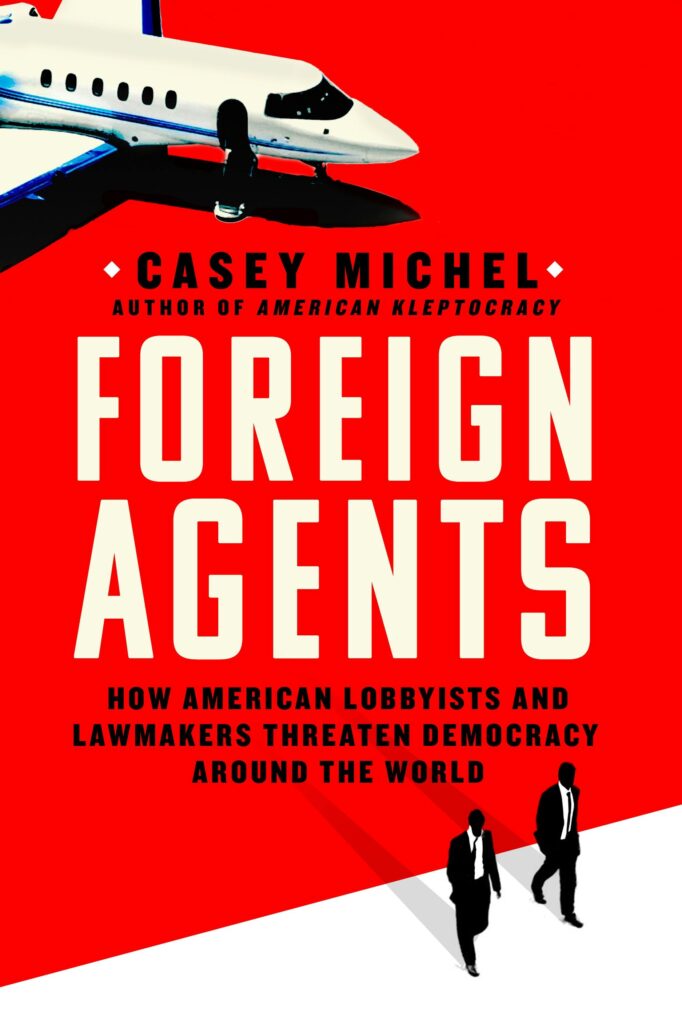Casey Michel is a journalist and director of the Combating Kleptocracy Program at the Human Rights Foundation. He is the author of Foreign Agents: How American Lobbyists and Lawmakers Threaten Democracy Around the World and American Kleptocracy: How the U.S. Created the World's Greatest Money Laundering Scheme in History.
For years, McKinsey was regarded as one of the most prestigious, and one of the most sought-after, consulting firms in the entire country. And with good reason. With deep political connections and with a roster of both remarkable recruits and successful alumni, McKinsey spent years dominating the entire consulting field, inking deals with companies like Coca-Cola and Microsoft, and even steering groups like the Bill & Melinda Gates Foundation. By the mid-2010s, McKinsey maintained a reputation that was, in many ways, unparalleled in the entire history of the consulting industry.
But around the same time, the supposedly pristine firm began scouring for clients beyond America. And as with lobbyists and law firms elsewhere, it didn't take long for McKinsey to intersect with some of the most monstrous regimes on the planet—and realize that there was bottomless money to be made.
Charting McKinsey's broader moral rot could comprise an entire book (and, indeed, it has, as seen in 2022's When McKinsey Comes to Town, by Walt Bogdanich and Michael Forsythe, which detailed McKinsey's responsibility for, among other things, America's opioid crisis and controversial immigration detention facilities). But for now, it's worth examining one of the key areas where McKinsey grew its business in the 2010s—and the only instance in which McKinsey has publicly declared itself, at long last, as a foreign agent.
As documents filed in 2020 disclosed, McKinsey had a few years earlier inked a deal with something called the Saudi Council of Economic and Development Affairs. The anodyne name of the client pointed directly to its financier: the regime in Saudi Arabia, one of the most anti-democratic forces on the planet. As the findings revealed, McKinsey hoovered up millions while helping the Saudi kleptocracy "grow and diversify" the Saudi economy. As part of its work, McKinsey organized conversations between Saudi officials and American "business leaders and think tank experts."
McKinsey became what many other firms before them had already transformed into: a foreign agent, and a foot soldier for dictatorship.
- Casey Michel
But it wasn't just meetings that McKinsey helped schedule for the Saudis. Among its other duties, McKinsey tasked employees with surveying American public attitudes toward Saudi Arabia, prepping Saudi officials for conversations with American counterparts, and creating an itinerary for Saudi officials in the United States. The group even helped set up a separate "Strategic Partnership Office," all the better to help the regime in "developing its partnerships" with countries like the United States.
At first blush, McKinsey's relationship with the Saudis was par for the course. Little matter that a firm like McKinsey had become a consigliere for a regime that, back home, launches mass executions, organizes beheadings, and treats women as effective chattel; in the world of foreign lobbying in Washington, this had all been normalized. But McKinsey didn't stop there. As The New York Times later reported, McKinsey had specifically pointed the Saudi regime to three critics who were dragging down the dictatorship's image. Shortly after flagging the dissidents for Saudi authorities, the regime unleashed a new crackdown. Officials arrested either the critics or their family members, jailing them on specious charges. McKinsey denied responsibility for the dictatorship's moves—the organization claimed it was "horrified" that the Saudis may have used the firm's work for such censorship—but the chain of events was clear. The regime tossed millions of dollars at McKinsey, which then fingered a range of dissidents tarnishing the image of the Saudis, who then directed their forces at smothering these critics. McKinsey got paid, and the dissidents got jail time—or worse.
And this is only one instance in a far longer litany of despicable moves McKinsey made abroad. In one remarkable moment, McKinsey organized a staff retreat in China's Xinjiang region—directly amidst China's ongoing genocide of Uyghurs, with Chinese authorities forcing millions of Muslims into the biggest concentration camp system the world has seen since the Second World War. "I think, by the very nature of the business, they are mercenaries," one journalist who's covered McKinsey said. "They will work for anyone."
It's an ethos that many other supposedly esteemed, allegedly prestigious firms in Washington would recognize. And it's an ethos that, at long last, drew McKinsey into becoming what many other firms before them had already transformed into: a foreign agent, and a foot soldier for dictatorship.

McKinsey's transformation was just one piece of the far broader evolution of the foreign lobbying space, which has continued well into the 2020s. Stay with the Saudis, for instance. The regime in Riyadh has proven willing and able to fund any number of former American officials, using them not only to launder the government's image but to gain access across Washington in the process. Spending more than $100 million on American lobbyists alone since 2016, this "army" of pro-Saudi lobbyists and public relations firms has targeted any threats to the reputation of Saudi dictator Mohammed bin Salman, the crown prince widely known as MBS. They've gone so far as to successfully fight lawsuits from families of those killed in the September 11 terrorist attacks, even "orchestrat[ing] a campaign that reportedly duped U.S. military veterans into lobbying against . . . 9/11 victims' families in exchange for a trip to Washington."
Along the way, building out this "extraordinarily well-financed lobbying and influence operation," the Saudi regime began tossing money at prestigious firms like McKinsey. But the Saudis didn't stop there. They've also begun hiring leading American military officers to their sides, carving out yet another area of influence for the regime. Since 2016, at least 15 retired American generals and admirals have joined the Saudi dictatorship's payroll, including Marine general James L. Jones, who served as Obama's national security adviser. While Jones at least alerted American military brass that he'd inked the deal with the Saudi regime, others ignored even those basic protocols, with some hirings only coming to light because of things like LinkedIn postings.
Because there are no filing requirements to disclose what Jones and the range of other former American military officers are doing on behalf of the Saudi regime, Americans remain in the dark about how they may be affecting U.S. policy. We have no idea what conversations they've been having, what positions they've been pushing, what policies they've stopped or upended or enacted as a result. (As we saw with the case of John Allen and Qatar in 2022, when the retired four-star general had to resign as president of the Brookings Institution following revelations of undisclosed lobbying for the Qatari government, former U.S. military officers are hardly strangers to liaising with Gulf dictatorships.)
And this is all from one regime, in Saudi Arabia. The despotic MBS may have overseen the murder of a Washington Post journalist, but he's busy authoring a brand-new playbook for lobbying Washington—one that the United States, even if it were to actually enforce the foreign lobbying regulations that are on the books, appears ill-equipped to fight.
The despotic MBS may have overseen the murder of a Washington Post journalist, but he's busy authoring a brand-new playbook for lobbying Washington.
- Casey Michel
Already, other dictatorships have followed suit. For instance, the United Arab Emirates has brought aboard dozens of former American military officials, some of whom have effectively acted as proxies for whitewashing the regime's image in Washington. The most prominent example is former Secretary of Defense Jim Mattis, who served as a "military adviser" to the UAE before joining the Trump White House—a relationship he never disclosed to the public. Mattis, as The Washington Post wrote, became the "most prominent American cheerleader" for Emirati forces—even while the UAE was accused of, among other things, overseeing torture camps and funding Russian mercenaries.
It remains unclear how much money Mattis, or many of the other high-ranking former American military officials, made from their work with foreign dictatorships. And it's a topic that's seen scant attention, with only a handful of articles and investigations in recent years. But it's one more data point in a long line of former American officials selling themselves to kleptocratic regimes—and tilting American policy, without any kind of disclosures along the way.
And it all comes as the momentum of the Trump era—an era in which the threats of unchecked foreign lobbying finally seemed to crest into national consciousness, and into an opportunity to finally push back—has clearly stalled, if not crumbled entirely. Prosecutors may finally be trying to enforce foreign lobbying regulations, but they've lost their cases, with courts and juries ruling time and again against them. Along the way, the Biden administration appears to have dropped the ball more broadly—all while new regimes and new foreign forces unspool their own new foreign lobbying playbooks.
All of which leaves one question: If the United States wants to actually uproot these foreign lobbying networks—and reveal just what effect they're having on democracy in the United States and abroad— what can actually be done?
*
Excerpted from FOREIGN AGENTS: How American Lobbyists and Lawmakers Threaten Democracy Around The World by Casey Michael © 2024 by the author and reprinted by permission of St. Martin's Press.





































